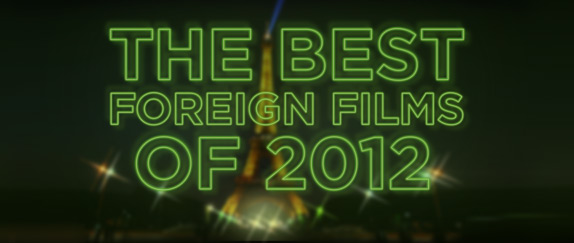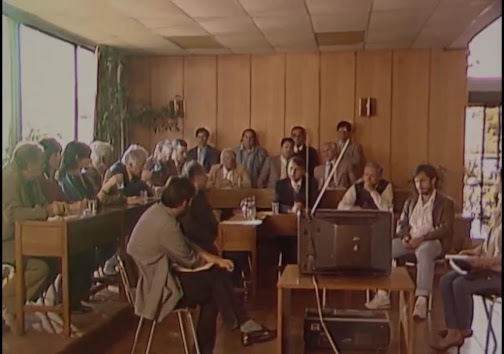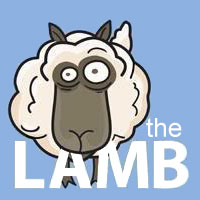No (2012)
Genre: Historical Drama
Director: Pablo Larraín
Starring: Gael García Bernal
Language: Spanish
Duration: 118 min.
Summary:
An ad executive comes up with a campaign to oust dictator Augusto Pinochet in Chile's 1988 referendum.
No is a film directed by Pablo Larraín, adapted by Pedro Peirano, from a play written by Antonio Skármeta. It is the third in a loose trilogy of films by Larraín set during Augusto Pinochet's regime, following 2008's Tony Manero and 2010's Post Mortem. It premiered in the Directors' Fortnight section of the 2012 Cannes Film Festival where it won the Arte Cinema Prize for best film. It is Chile's official entry to the 85th Academy Awards for Best Foreign Language Film.
It follows René Saavedra (a fictional composite of real life figures, played by Gael García Bernal), a young hot-shot ad executive, hired to run the 'No' campaign for the 1988 Chilean public referendum, which was held under serious international pressure, to determine whether or not Pinochet should remain in power.
Larraín went with an interesting and unique stylistic choice here, shooting the entire film with U-matic video cameras (the ones used by television news crews in the 70's and 80's) to give the film a distinct retro look. Grainy, pale, and low-res, it's not pretty, especially projected on a massive screen where all the flaws are even more apparent, but it's ultimately a successful effect which allows him to seamlessly blend many real life archival clips into the film, often blurring the boundaries between which parts are real and which are acted.
Despite the low tech visuals, Larraín assembles some very impressive set pieces throughout. Painstakingly accurate recreations of the commercial shoots, a massive street celebration that turns ugly, and the remarkably suspenseful final sequence in the packed No headquarters as the election results are revealed, are all highly memorable cinematic sequences that contradict the shot-on-video appearance of the film.
It's partly a tense political thriller full of intrigue, with constant threats of violence and intimidation. To complicate things, Réne ends up going against his ad agency boss (Alfredo Castro), who's in charge of the government backed 'Yes' campaign. It's also an outrageously funny and ironic comedy that is fully aware of the undeniable cheesiness of the 80's, down to every last tacky period detail.
However, it stumbles with the dramatic subplot of the main character's personal life. A tentative love story slash familial crisis involving his estranged political activist wife (Antonia Zegers) and young son (Pascal Montero), goes nowhere and adds little to his enigmatic character. Though it's no fault of the acting. Bernal has that effortless movie star charisma, and totally captivates us even though the role is not a flashy one. His cool subtle delivery and understated manner throughout stand in an almost absurd contrast to the monumental ramifications of his actions.
Even with its flaws, it's still an inventive and entertaining capsule of recent history well worth checking out. Chilean or not, it will no doubt provide a large dose of nostalgia to those who remember the era, and it's guaranteed to ingrain that jingle in your head for a long time afterwards.
It follows René Saavedra (a fictional composite of real life figures, played by Gael García Bernal), a young hot-shot ad executive, hired to run the 'No' campaign for the 1988 Chilean public referendum, which was held under serious international pressure, to determine whether or not Pinochet should remain in power.
Larraín went with an interesting and unique stylistic choice here, shooting the entire film with U-matic video cameras (the ones used by television news crews in the 70's and 80's) to give the film a distinct retro look. Grainy, pale, and low-res, it's not pretty, especially projected on a massive screen where all the flaws are even more apparent, but it's ultimately a successful effect which allows him to seamlessly blend many real life archival clips into the film, often blurring the boundaries between which parts are real and which are acted.
Despite the low tech visuals, Larraín assembles some very impressive set pieces throughout. Painstakingly accurate recreations of the commercial shoots, a massive street celebration that turns ugly, and the remarkably suspenseful final sequence in the packed No headquarters as the election results are revealed, are all highly memorable cinematic sequences that contradict the shot-on-video appearance of the film.
It's partly a tense political thriller full of intrigue, with constant threats of violence and intimidation. To complicate things, Réne ends up going against his ad agency boss (Alfredo Castro), who's in charge of the government backed 'Yes' campaign. It's also an outrageously funny and ironic comedy that is fully aware of the undeniable cheesiness of the 80's, down to every last tacky period detail.
However, it stumbles with the dramatic subplot of the main character's personal life. A tentative love story slash familial crisis involving his estranged political activist wife (Antonia Zegers) and young son (Pascal Montero), goes nowhere and adds little to his enigmatic character. Though it's no fault of the acting. Bernal has that effortless movie star charisma, and totally captivates us even though the role is not a flashy one. His cool subtle delivery and understated manner throughout stand in an almost absurd contrast to the monumental ramifications of his actions.
Even with its flaws, it's still an inventive and entertaining capsule of recent history well worth checking out. Chilean or not, it will no doubt provide a large dose of nostalgia to those who remember the era, and it's guaranteed to ingrain that jingle in your head for a long time afterwards.
— Bonjour Tristesse





























13 comments:
Wow. that really looks like a 70s film with that aspect!! Interesting
I've been wanting to see this one. I'll have to check out the directors other two films too. Love Chilean films but never seem to see enough of them.
wow, the oldschool video tape look is hitting my nostalgia nerve super hard right now.
Almost makes you feel like you should be watching it on an old CRT with rabbit ears.
Yeah, I've yet to see his first couple films, but I think this one will be right up your alley for sure.
I had that feeling all the way through, crazy how much has changed in only 25 years.
I wanna see it. What I don't know is.. if I should watch the other two before it. Think it might make a big difference?
No, I don't think it matters because they aren't really connected, they are just set in the same era.
I think it might be worth getting tickets for this solely based on the technical choices the director made and probably Bernal too. Seeing the reactions of the Perth International Arts Festival's usual crowd of middle aged women might be fun too.
Yeah, Bernal seems to be a big draw for that crowd. There was quite a loud section of cheering ladies at the end of my screening.
Cheering? Is that a thing that people actually do?
It is common around here for there to be a polite round of applause at the end of a film. This one got more than the usual claps though. Personally, I've always found it silly to clap at a screen, unless I know the director is in the room or something like that.
Fascinating. I somehow assumed it was a Hollywood cliche or something.
The usual crowd are not exactly known for their appreciation of innovation. Italian romcoms do very well indeed.
Post a Comment